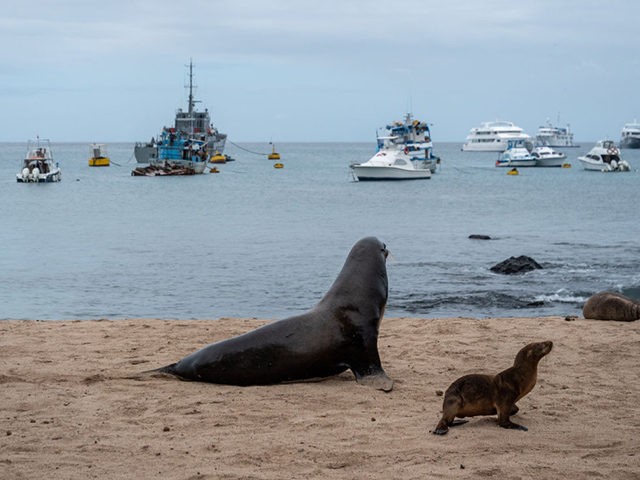The U.S. supports Ecuador in denouncing China’s illegal fishing off the Galápagos Islands, a biologically sensitive marine reserve, U.S. Secretary of State Mike Pompeo said in a statement Sunday.
Late last week, Ecuador’s navy said it was “on alert” over China’s most recent illegal fishing activities off of the country’s coast. At the time, a Chinese fleet of at least 260 vessels was inching “very close” to the edge of Ecuador’s exclusive economic zone, which surrounds the Galápagos, the archipelago’s governor, Norman Wray, said.
“We firmly support Ecuador’s efforts to ensure [People’s Republic of China] PRC-flagged vessels do not engage in illegal, unreported, and unregulated fishing and stand with States whose economies and natural resources are threatened by PRC-flagged vessels’ disregard for the rule of law and responsible fishing practices,” Pompeo said in Sunday’s statement.
“China subsidizes the world’s largest commercial fishing fleet, which routinely violates the sovereign rights and jurisdiction of coastal states, fishes without permission, and overfishes licensing agreements … The Ecuadorian government has … rais[ed] the alarm about the hundreds of PRC-flagged vessels fishing near Ecuador’s important Galápagos marine reserve and harvesting endangered sharks for their fins, along with many other protected species,” the statement read.
With nearly 300 vessels, the Chinese-led fleet represents a major logistical undertaking. To remain at sea for long periods of time, a fishing fleet of its size requires special storage and supply vessels.
“There are suspicions, so far unconfirmed, that the Chinese fleet is being aided by South American associates because it is so far from home. For example, they could be selling it fuel,” Luis Suárez, vice president and executive director of Conservation International in Ecuador, said last week.
The largely Chinese fleet includes “Liberian — and Panamanian-flagged boats,” Ecuador’s foreign minister, Luis Gallegos, said last week. Ecuador seeks “deeper coordination” with Panama, Colombia, Peru, and China’s closest Latin American ally, Chile, “on protecting the eastern tropical Pacific,” Gallegos said.
Endangered whale and hammerhead sharks are among the species prevalent in the waters of the Galápagos Marine Reserve; the sharks are especially vulnerable to China’s illegal fishing fleets, which target them.
It is possible that “long fishing lines from the Chinese vessels could be drifting into [Ecuador’s] exclusive economic zone,” Luis Villanueva, a member of the Pew Bertarelli Ocean Legacy Project, said last Thursday, adding that this has yet to be proven.
In 2017, Ecuador seized a Chinese boat fishing within the boundaries of the Galápagos Marine Reserve. Ecuadorian authorities arrested 20 of its crew members, who were found with 6,000 sharks on board.
A UNESCO World Heritage site, the archipelago is protected for its high levels of endemism, or “species found nowhere else on earth,” according to the Galapágos Conservancy. The islands’ unique biodiversity sparked Charles Darwin’s theory of evolution.

COMMENTS
Please let us know if you're having issues with commenting.